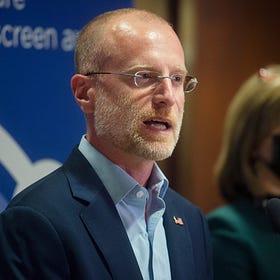5 laws FIRE wants on the books to protect free speech
Even with the robust protections offered to us by the First Amendment and the decades of decisions made by our federal and Supreme courts, defending free speech is still difficult business. Infringements on our rights often take advantage of loopholes and gaps in our legal frameworks, leading to actions — particularly from those in power — that violate our expressive rights and chill free speech.
That’s why FIRE has long championed a variety of proposals to help safeguard free expression from government attacks and abuse, including federal legislation. But what would that legislation look like?
Here are five legislative proposals FIRE has recommended to Congress to bolster free speech rights for everyone and make censorship by federal officials more difficult — no matter what party is in power.
Improve transparency and accountability for jawboning
“Jawboning” refers to situations in which a government official informally coerces a private party to censor constitutionally protected speech.
For example, when the head of New York’s Department of Financial Services threatened to wield her regulatory powers over several insurance companies unless they stopped doing business with the National Rifle Association — because she didn’t like their viewpoint — that was textbook jawboning. The NRA sued, and the Supreme Court unanimously ruled that these acts, if proven, are unconstitutional.
More recently, when FCC Chairman Brendan Carr threatened Disney and ABC over talk show host Jimmy Kimmel’s comments regarding the Charlie Kirk assassination, leading to Kimmel’s suspension, that was also a clear case of jawboning. “We can do this the easy way or the hard way,” Carr said. “These companies can find ways to take action on Kimmel or there is going to be additional work for the FCC ahead.”
Carr’s threats to ABC are jawboning any way you slice it
In 1867, the Supreme Court ruled in Cummings v. Missouri that the state could not use loyalty oaths to bar ex-Confederates from teaching, preaching, or practicing law. The oaths themselves were (at the time) lawful, but Missouri …
Jawboning is a growing threat to free speech as more discourse happens on social media, where the government can reach out to platforms behind closed doors and censor speech without anyone else — including the speaker — knowing the government was involved. When this happens, civil society and the public cannot track what’s happening or adequately respond. Often, it’s only through the leaks of information after the fact that we even become aware it happened at all, as we saw with the Twitter Files.
As we’ll get into more deeply below, we’d like to see legislation to help deter these kinds of First Amendment violations, including jawboning, by allowing people to sue federal officials for damages when they violate constitutional rights.
However, for this to be effective against jawboning on social media platforms, we will need greater transparency into the government’s communications with tech companies. To achieve that, FIRE recommends Congress pass legislation to require federal officials to publicly report their communications with social media companies about user content on their platforms. One option is FIRE’s Social Media Administrative Reporting Transparency (or SMART) Act, which accompanied our Report on Social Media.
By forcing officials to either hold off on jawboning or do it out in public, where they’ll be subject to scrutiny and possible damage awards, we can curb backdoor censorship.
Codify First Amendment protections on campus
FIRE also recommends Congress pass the Respecting the First Amendment on Campus Act, or similar campus speech legislation, to better protect First Amendment rights at public universities by putting existing constitutional protections into federal statute.
This includes ending “free speech zones,” where speech is restricted campuswide except for small, designated areas — often remote and easily ignored — effectively nullifying student expression. It also includes the prohibition of excessive security fees that colleges sometimes impose on events involving controversial speakers, as a thinly veiled attempt to stop the event from happening.
We’ve also long supported legislative efforts to rectify the Department of Education’s abuse of antidiscrimination law to suppress protected speech. One important thing Congress can do is to codify the Supreme Court’s Davis standard for when peer-on-peer harassment creates a hostile environment in violation of federal civil rights laws, including Title VI of the Civil Rights Act, or its sister statute, Title IX. Under Davis, protected speech only rises to a violation of these statutes if it is:
So severe, pervasive, and objectively offensive, and . . . so undermines and detracts from the victims’ educational experience, that the victim-students are effectively denied equal access to an institution’s resources and opportunities.
The Education Department under both Presidents Obama and Biden explicitly claimed that Davis did not apply to its regulatory activities (only to civil lawsuits brought under federal antidiscrimination laws). Nor is the Trump administration following Davis in its Title VI enforcement efforts.
Instead, under each administration, the Education Department has concocted similar-sounding standards that (unlike Davis) can allow a single instance of protected speech to violate Title VI or IX. This pressures schools to suppress any speech that is deemed hurtful to protected groups, leading campuses to commit an endless stream of free speech violations. The Davis standard prevents this while still ensuring the Department can address actual, undeniable discriminatory harassment.
We also recommend pairing the Davis codification with a codification of religion as a protected class under Title VI, and codification of longstanding federal guidance that says Jewish students and other groups of shared ethnicity can avail themselves of Title VI, based on its protections against discrimination on the basis of national origin. Taking these steps would create another protection against genuine student harassment without infringing on other students’ free speech rights.
Let people sue federal officials for damages when they violate constitutional rights
Much of the censorship federal officials engage in is already illegal. In many cases, these officials are committing straightforward constitutional and statutory violations, and asserting authority that they simply don’t have.
When state officials violate constitutional rights, including under the First Amendment, victims can sue them to obtain monetary damages and can collect attorneys’ fees. This provides a direct, personal incentive for state officials to respect Americans’ rights.
Unfortunately, that doesn’t exist at the federal level. Federal officials can only be sued to get the violations to stop, not to actually get compensation or accountability. This gives officials an incentive to continue their unconstitutional behavior because they have no skin in the game. They may be stopped after the fact, but they aren’t personally deterred from committing the violation in the first place.
FIRE recommends Congress pass legislation to let people sue for damages when federal officials violate someone’s constitutional rights. This would create a stronger incentive for federal officials to respect Americans’ rights by giving victims teeth when fighting back.
Create strong anti-SLAPP rules in federal court
A strategic lawsuit against public participation, or SLAPP, is a frivolous lawsuit someone files in order to punish a critic or opponent for their speech. The idea of a SLAPP is not to win on the merits of the case, but to retaliate against someone exercising their First Amendment rights. People who engage in SLAPPs do this by dragging their targets through a costly court process, or getting them to settle and retract their speech in order to avoid such costs.
Too often, the powerful use SLAPPs to send a clear, speech-chilling message: “Speak out against me, and I will ruin you.”
Anti-SLAPP laws protect Davids from being silenced by Goliaths
The First Amendment was born out of colonial attempts to silence the press with libel laws. Yet more than two centuries later, the wealthy and powerful still use the legal system to bully critics into submission through meritless defamation lawsuits — also known as strategic lawsuits against public participation, or SLAPPs.
Most of these lawsuits come from private individuals and corporations, but lawsuits by government officials against their critics — including news outlets — have also become a problem in recent years. California Gov. Gavin Newsom, for example, filed a defamation lawsuit against Fox News in June, arguing that host Jesse Watters “misleadingly edited a video” to claim that Newsom lied about a phone call he’d had with President Trump. Or consider President Trump’s $15 million suit, filed last month against Penguin Random House and The New York Times for news articles he claims were designed to limit his prospects in the 2024 presidential election.
Many states have passed robust protections against SLAPPs, which speed up the process to dismiss frivolous cases and require the person who filed the SLAPP to pay the other side’s attorneys’ fees. However, plaintiffs can often evade state anti-SLAPP laws by filing in federal court. FIRE recommends Congress pass a federal anti-SLAPP law to plug that gap.
Remove the FCC’s ability to regulate broadcast content
Last, but certainly not least, FIRE also recommends Congress pass legislation to clarify that the FCC has no authority to regulate content on broadcast TV and radio.
In every other medium of communication, the First Amendment bars the government from regulating the content of speech protected by the First Amendment unless the action can survive strict constitutional scrutiny. Broadcast TV and radio, however, have been treated somewhat differently. Because the “airwaves” were historically seen as a finite resource, and one of only a small number of ways to share speech with a mass audience, the Supreme Court allowed the FCC to engage in some regulation of content by broadcasters.
But that leeway has always been minimal, and the Communications Act specifically denies the FCC the power of censorship. Courts over the past five decades have also grown increasingly skeptical of the few areas of content regulation that were considered permissible. Recently, FCC officials have ignored these developments and mischaracterized the FCC’s “public interest” authority as a blank check to regulate content. It isn’t — and never was.
Congress can play an important role by clarifying that the “scarcity rationale,” which was originally thought to support different constitutional treatment for the broadcast medium, has long since been eclipsed by technological changes. It actually said so once before, when it adopted the Telecommunications Act of 1996, but it should be more explicit this time by also deleting the few areas where the statute authorizes content regulation.
This should make clear that recent examples of the FCC’s misuse of the public interest standard are being beyond its authority. A prime instance of this is Chairman Carr’s invocation of the public interest standard to threaten ABC over the content of Jimmy Kimmel’s speech. This would also make clear that historic examples, such as the Democratic National Committee’s campaign during the Kennedy administration of filing FCC complaints to silence conservative radio commenters, were illegitimate.
Inside the Trump administration’s extortion-industrial complex
“A cold wind just blew through every newsroom this morning.”
Another recent example of the FCC’s weaponization of its authorities is the FCC’s various actions to dust off an obscure policy against “news distortion” as a way to oversee broadcasters’ editorial judgments. As FIRE has noted in an FCC filing, that policy, originally designed to address “deliberate distortion or staging” of news events, was almost never invoked or enforced. That is for good reason: FCC commissioners understood that the commission could not function as the nation’s speech police. And until the past few months, the commission realized both the Communications Act and the First Amendment barred any attempt to revitalize the news distortion policy. Congress should remind the FCC of that fact.
Earlier this year, FIRE filed a comment encouraging the FCC to withdraw these and all of its other content-based regulations. A few of those regulations are required by federal law, and so it’s up to Congress to repeal them. Others are just within the FCC’s interpretation of its authority. To address those, we recommend Congress explicitly bar the FCC from regulating any constitutionally protected content.
Why this matters now, and why it will always matter
The bottom line with all of these proposed laws is simple: we must limit the government’s power to censor either directly or indirectly.
Although free speech issues are getting more attention this year as a result of the current administration’s actions, the threats these laws are designed to address began before our current political turmoil, and will continue long after it ends — unless Congress steps in to do something about it. Our goal is not to merely prevent one side or the other from abusing their power and targeting protected speech; it is to prevent any administration from doing so. This approach is the only way to successfully protect our First Amendment rights and the democratic culture it is meant to preserve.






